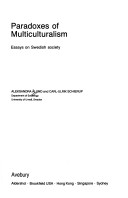Research in Ethnic Relations
2 total works
Migration, Socialism and the International Division of Labour
by Carl-Ulrik Schierup
Published 29 August 1990
Paradoxes of Multiculturalism
by Aleksandra Alund and Carl-Ulrik Schierup
Published 5 September 1991
Sweden is unique in Europe, both in the development of its general welfare policies and in its avant-garde immigrant policy aims. Yet, mainstream ideology and praxis tend to render a prescribed multiculturalism a form of cultural determinism veiling the structure of power underlying racial, ethnic, gender and class inequalities. Within a comparative framework Alexsandra Alund and Carl-Ulrik Schierup scrutinize paradoxes of multiculturalism inherent in the intersection between the programmed society's enlightened monitoring and a communicative public interchange. They critically reasses dominant political, institutional and academic discourses as reflected within a number of fields: a changing refugee poicy, the representation of immigrant women and youth, the public space of immigrant communities and contemporary social movements. Discussing dilemmas of a dismantling welfare state under the complex conditions of globalization-localization in Europe, the book focuses on pertinent issues of trans-ethnic agency and exposes the need for more composite notions of "politics", "class", "state", "civil society" and "everyday life".

